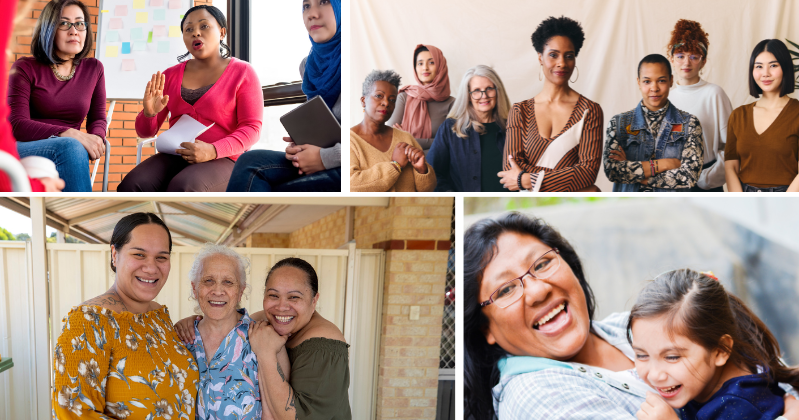The Utah Women & Leadership Project (UWLP) at Utah State University recently published a research brief, “Belonging in Utah: Findings from Community Conversations with Women of Color.” The report draws from seven focus groups with Women of Color along the Wasatch Front to identify shared and community-specific themes related to their experiences. The findings reveal both interconnected challenges and those unique to specific racial and ethnic communities. The goal of this work is to elevate diverse perspectives and encourage leaders and community members to consider additional insights that foster greater inclusion and belonging throughout the state.
Background and Research Methods: From August 2024 to May 2025, the UWLP held seven focus groups with 85 Women of Color along the Wasatch Front. Groups included: Asian, Black, Hispanic/Latina, Native American, and Middle Eastern, with two gatherings focused on Native Hawaiian/Pacific Islander women. Each 2-hour session included a guided discussion of five core questions surrounding emotional connection, community welcome, influence, value, and ways to increase statewide belonging for women.
Recurring Themes: The analysis of the seven focus groups showed three main themes: 1) being “the only,” 2) feeling overlooked, and 3) intentional relationship building. Most participants reported experiencing frequent isolation and tokenization in classrooms, workplaces, and community spaces, with many of their contributions going unrecognized. In contrast, belonging was intentionally cultivated through cultural events, religious groups, and social networks, fostering emotional support, a sense of purpose, and a commitment to inclusive leadership for future generations.
Specific Themes by Focus Group:
Asian American Women: Belonging in Utah was shaped by faith, cultural visibility, education, and navigating language differences, with shared Latter-day Saint spaces and supports, such as playgroups, fostering emotional connections. Growth in Utah’s Asian population, reflected in restaurants, businesses, and hubs like H Mart, enhanced recognition, while all participants emphasized education as a critical pathway to opportunity. Women also expressed a strong desire for greater leadership representation and for intentionally creating inclusive spaces for future generations.
Black Women: Participants described unique challenges around safety, religious culture, professional recognition, and racial visibility, reporting threats to physical and emotional safety, heightened vigilance, and difficulty fitting into Latter-day Saint spaces, even for members. Professionally, they experienced invisibility, undervaluation, and pressure to be “twice as good” to gain recognition, with race shaping daily interactions more than in other locations. Despite barriers, women emphasized the importance of intentional community building, mutual support, and self-advocacy as key to fostering a sense of belonging and creating inclusive spaces.
Latino/Hispanic Women: Participants described isolation, the time required to build community, and challenges navigating Latter-day Saint and social spaces, encountering both subtle and overt exclusion and barriers to professional or civic participation. They reported pressure to “represent” while managing imposter syndrome, with competition arising when roles were limited. Women emphasized owning their identities, advocating for themselves and others, and building intentional connections, as well as mentoring and fostering allyship to create a sense of belonging and empower future generations.
Native American/Indigenous Women: Participants emphasized a deep, spiritual connection to Utah’s land, viewing it as sacred and tied to ancestors, with concern for its care and protection from neglect or misuse. They described navigating patriarchal structures that contrast with matriarchal traditions, experiencing intra-community divides based on tribal, urban/reservation, and religious differences, and the ongoing responsibility to represent, teach, and share their culture. Despite frustrations with exclusion and limited recognition, women highlighted the importance of advocacy, mentoring, and creating intentional spaces to connect, educate, and empower both Native communities and future generations.
Native Hawaiian/Pacific Islander Women: Participants emphasized the need for greater awareness of and access to resources for women across Utah, noting that many do not know where to look or what questions to ask. Many described Utah as an “accidental” home, where roots formed over time through family, education, and community connections. They also discussed being perceived primarily through cultural stereotypes, valued for their Hawaiian traditions or events, but often overlooked for their other contributions, and expressed a desire for broader representation in professional and civic spaces. Advocacy was seen as vital to belonging, although participants noted barriers including cultural norms, trust issues, and gender biases. Overall, the women highlighted the importance of building connections, creating inclusive spaces, and taking action to strengthen community support.
Due to the small sample size, the Middle Eastern Women’s focus group is not discussed separately but is included in the recurring themes above.
“We believe that when the unique challenges highlighted by each group are addressed and when the collective feelings of isolation and invisibility are mitigated, Utah will be a truly welcoming place where all individuals can thrive, contributing their full, diverse talents to the collective well-being of our state,” said Susan Madsen, UWLP founding director and co-author of the report.
Nadia Cates, former UWLP multicultural outreach coordinator, and Kolene Anderson, former UWLP associate director, were also co-authors of the report.
The “A Bolder Way Forward” initiative provides opportunities for Utahns to learn and contribute to meaningful change across 18 areas of focus. For more information, visit the UWLP website at utwomen.org. The UWLP is affiliated with the Jon M. Huntsman School of Business and USU Extension.

